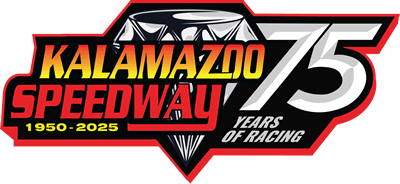Bergakker Climbs The Rungs At Kalamazoo
October 26, 2012 – 12:11pm
DAYTONA BEACH, Fla. — Brian Bergakker methodically climbed to the top rung of Michigan NASCAR Late Model racing. The 15-year journey culminated with his first NASCAR Super Late Model track championship and state title at Kalamazoo Speedway in 2012.
Bergakker won the track title by 25 points and the state title by 19 points over 12-time Kalamazoo champion Andy Bozell. His racing record for the season is three wins, 10 top fives and 12 top 10s in 13 starts.
“We decided in late January to get back to racing full time at Kalamazoo this year,” Bergakker said. “We bought a new chassis from Senneker Performance and started putting it all together.”
After ignition issues resulted in an 18th-place finish on opening night in April, Bergakker posted his first win of the season in week two.
“That first win was a big lift and a big eye-opener,” Bergakker said. “I thought ‘now we have something we can race with.’ We started out down in points, but the win helped our budget. We kept getting better and better with fast times and top-three finishes.
“After the first six weeks we were good and fast. If you’re faster than Andy and Phil Bozell, you know you’re fast. Our crew chief Jake Finkbeiner said he thought we could win the championship if we kept our noses clean. So we tried to race smart.”
Opening night was the only finish outside the top 10. Bergakker continued to post top five finishes. He took his second and third wins of the season in August. But it was a third-place finish on Aug. 11 that was pivotal to the outcome of the season. Season-long point leader Bozell brought a 40-point lead into the event.
“Andy had engine problems and finished 13th while we finished third,” Bergakker said. “We had an eight-point lead after the race built it up to 21 points when we won the next week. We ended up winning the championship by 25 points.”
“Andy is the guy that everyone at Kalamazoo Speedway measures themselves by,” Bergakker said. “He races smart and clean and rarely has mechanical failures.”
The wedge-style Super Late Models at Kalamazoo are among the swiftest in the nation. Race lap times around the banked .375-mile oval are in the mid-12 second range. In the track’s annual “Call of the Wild” speed trials, Bozell holds the record at 10.020 seconds at an average speed of 134.730, set last year.
Bergakker, 32, of Lowell, Mich., started out racing in the Street Stock division in 1997. He moved to Limited Late Models and placed second in points five consecutive years. He moved to the Modified division in 2007. He won his first track championship the following season with 13 wins in 16 Modified starts. In 2009, he switched to the Super Late Model division and won NASCAR’s state rookie-of-the-year award. He spent 2010-11 racing in Modifieds around the region before returning to Kalamazoo this year.
“We’re looking forward to going to the NASCAR Whelen All-American Series banquet in Charlotte (N.C.) in December,” Bergakker said. “I went as rookie-of-the-year with our track champion Terry Senneker in 2009. It’s amazing what NASCAR does for their champions.”
In addition to Finkbeiner, team members include his dad Darwin, wife Jessica, Troy Wilkes and Jason Bennett. Sponsors include Bergakker’s employer Senneker Performance, Enterprise Iron & Metal, and Clean Cut Detailing.
Bergakker will be honored for his track and state championships at the NASCAR Whelen All-American Series Awards event. The ceremonies are scheduled for Friday, Dec. 7 at the Charlotte Convention Center’s Crown Ballroom at the NASCAR Hall of Fame.
A driver’s best 18 results through Sept. 16 were counted toward their state and national point totals, and the champions are decided on overall point total. Once a driver reaches 18 starts, their total would increase incrementally as they replace some poorer runs with better results.
Under the point structure for the NASCAR Whelen All-American Series, the race winner receives two points for every car in the event up to 20 cars. Second place receives two fewer points and so on through the field. Race winners receive an additional five points. For example, if 20 cars are in the field, the winner receives 45 points, second place 38 and third 36. If there are 15 cars, the winner receives 35 points, second 28 and third, 26.


